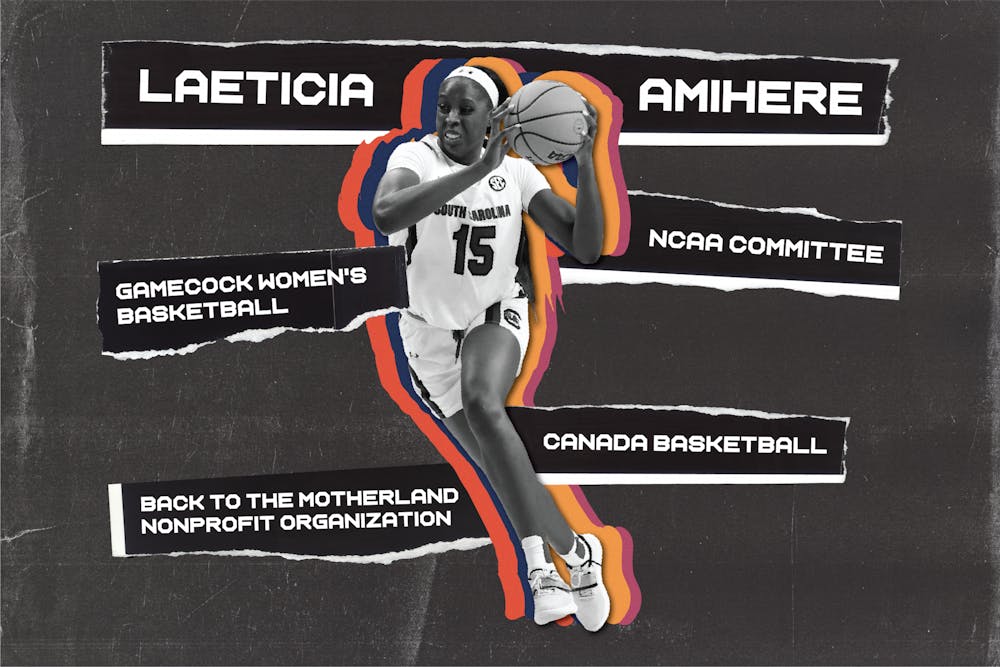Senior forward Laeticia Amihere understands the importance of looking up to role models, especially for freshmen who are adjusting to life as college basketball players.
“As a freshman, we were able to lean on (former Gamecock women’s basketball players Mikiah Herbert Harrigan and Tyasha Harris) and being able to pick their brains, so us being that for them as well is really important,” Amihere said during a media availability in December 2021.
In her four years at South Carolina, she has become a role model for her teammates in Columbia and beyond. She is an ambassador for the sport of basketball and an advocate for equal opportunities in communities across the globe.
Amihere arrived at South Carolina as the No. 10 overall recruit in the class of 2019, according to ESPN. Since then, she has won a national championship,represented the Canadian national basketball team, and has served on committees at USC and the NCAA to help enhance the student-athlete experience.
Before playing a minute of college basketball, though, Amihere had to overcome injuries that ended both her junior and senior seasons of high school early.
She has filled in to play multiple positions when her teammates have been forced to miss time due to their own injuries. That versatility was put on display in a 2021 matchup against Kansas State, where she tallied 11 points, seven rebounds, seven assists and five blocks as a "point forward", demonstrating a unique set of skills that have impressed senior guard Brea Beal.
“Throughout the years being put in different positions (and) being able to dominate those positions, I think it’s just amazing to watch,” Beal said.
Amihere said she relies on her faith and advice from head women’s basketball coach Dawn Staley whenever she experiences hardship in her life.
“Just trusting in God because, obviously, my plans, if I had to choose, would be a lot different than what it is right now," Amihere said during a press conference ahead of the Final Four in April 2021. "And I remember when I got injured, (Staley) said, ‘This is your part of your testimony, and you’re going to have a great story to tell.' So after seeing that, it just put a smile on my face, and it gave me a lot of hope.”
Those hardships inspired her to create a non-profit organization, Back to the Motherland. The non-profit provided basketball gear and hosted a free basketball camp for young girls in the Ivory Coast, and she hopes she can hold events such as these annually.
“I play basketball every day … and now I get injured for six to nine months, and it’s like, ‘Who am I? What do I have to give to the community?’” Amihere said in a video posted on her non-profit’s Instagram page. “In the Bible, it talks about Jesus going back as a servant … the highest person, he goes back to his community, he takes the people that are undeserving, and he takes those people under his wing, so that’s what I want to do.”
Amihere said she especially wants to help players whose families cannot afford to pay for recreational basketball, something she experienced herself when she was younger.
Senior guard Zia Cooke said Amihere’s faith and dedication to the community have served as a source of inspiration for her and her teammates.
“She’s a leader in a lot of ways off the court — dealing with the community,” Cooke said. “She’s taught us a lot (and) put a lot of us under her wing when it comes to the spiritual side, so she’s a blessing.”

Head coach Dawn Staley said that Amihere will have to face one of her toughest tests this upcoming season, as she is dealing with the loss of her brother, who passed away in August.
“She’ll carry what’s happened to her throughout the entire season,” Staley said. “Obviously, he was near and dear to her … and a big part of her is no longer with her, so we’ll definitely have to keep an eye on her to make sure that we’re covering her with prayers and hoping she’s in a great mental state throughout the season.”
Beal said she was also inspired by Amihere’s ability to push through adversity without it affecting her demeanor or her style of play, which gives her hope for when she experiences similar hardships.
“To see her go out to practice and act like nothing’s wrong and to continue to be the player she’s always been, it is encouraging because we all go through our battles, but it’s how you handle them, and I think she’s handled them so well,” Beal said.
Editor's note: Michael Sauls contributed to the reporting in this article.

